Families Of Iran Protest Victims Vow to Continue Fight for Justice
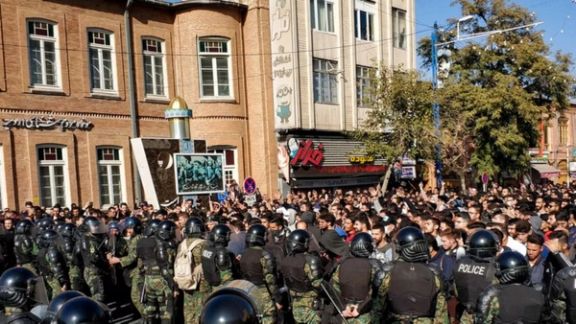
Families of Iranians killed during the nationwide protests of the past year and those of November 2019, vowed to continue their uprising against the Islamic Republic.

Families of Iranians killed during the nationwide protests of the past year and those of November 2019, vowed to continue their uprising against the Islamic Republic.
In a joint statement, accompanied by the hashtag "November Continues,” they expressed their determination on social media, declaring “We, as families seeking justice, announce that, at the risk of our lives, we will continue the path of November against the Islamic Republic."
The 2019 protests, often referred to as Bloody November, initially erupted due to a significant increase in fuel prices, quickly transforming into demands for government overthrow and opposition to Supreme Leader Ali Khamenei.
According to a rights group report, the Islamic Republic security forces allegedly killed at least 3,000 protesters from November 15 to 17, with nearly 20,000 arrests. Reuters, at the time, reported 1,500 deaths.
Recent reports from rights groups also shed light on the aftermath of protests sparked by the 2022 death of Mahsa Amini in custody, indicating that over 500 people, including minors, lost their lives, thousands were injured, and 22,000 were arrested.
The Islamic Republic's response to the protests has included several death sentences for demonstrators, with seven of them already executed.
The Iranian judiciary claims the verdicts were issued by a fair trial, but details were not disclosed. The government often restricts defendants from choosing their legal representation, and due process is frequently absent in similar cases.
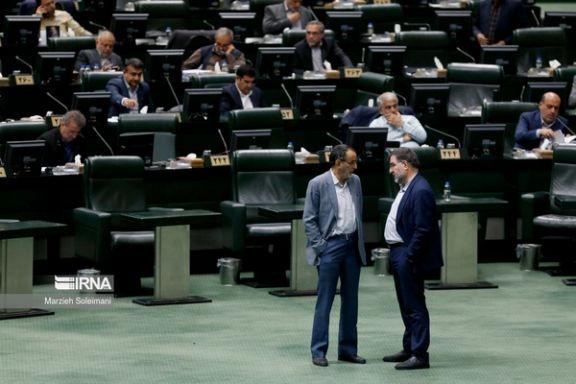
Concerns over a breach of Iranians’ privacy are growing as hardliners in the government defend a recent legislation to monitor peoples’ lifestyles online.
The controversial legislation, a clause of Article 75 of the Seventh Development Plan, mandates the Ministry of Islamic Guidance to launch a database consisting of information collected from online activities of individuals for "continuous monitoring and evaluation of cultural indicators, people’s lifestyles, media influence, and communications."
The legislation also requires government agencies and all domestic websites and platforms, including online businesses, to continuously feed their user information to the database.
Media and individuals on social media have extensively criticized the legislation that the parliament approved on November 8 but has yet to be endorsed by the constitutional watchdog, the Guardian Council.
Detractors, including legal experts, express concerns over the lack of assurance regarding the safety of individuals' sensitive personal information, despite a reference to Article 25 of the Iranian Constitution in the legislation. Article 25 explicitly prohibits the government from engaging in spying on citizens' private communications, “unless when required by law.”
Critics argue that this provision would empower any judge to override individuals' right to privacy whenever authorities, including security forces, decide to obtain private information and data derived from an individual's online activities across various platforms. This encompasses information related to travel and transportation, as well as online searches and downloads.
An earlier version of the proposed legislation explicitly outlined that the collected data would be utilized by authorities to "consolidate the Islamic-Iranian lifestyle," aiming to ensure that people's lifestyles align with the perceived Islamic standards of the regime.
In an interview with Ham-Mihan newspaper, Ali Yazdikhah, the deputy chairman of the parliament’s cultural committee, insisted that only "macro-data" would be stored in the database, emphasizing that it would not include information on individual citizens' lives and lifestyles. However, he acknowledged that data inputted into the system, such as individuals' interests or participation in religious ceremonies like Ashura, could be utilized to assess the general interest "in [Islamic] values and sanctities."
Several critics, including lawmaker Moeeneddin Saeedi, who opposes the bill, argue that the more the state engages in cultural engineering, the greater resistance it will encounter from the public. Saeedi stated, "Experience has proven that we have failed to advance indicators of culture with these [engineering] methods," he said during the debate on the parliament floor.
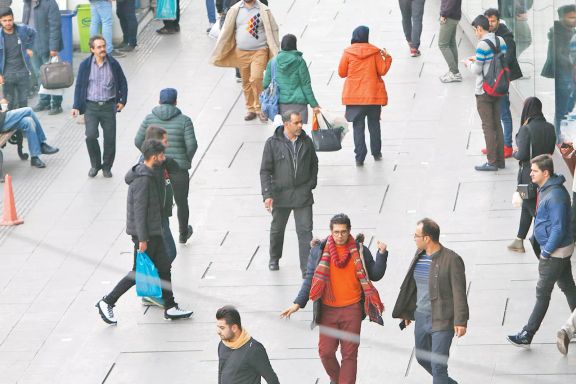
As an example, Saeedi pointed out that the current year's budget law stipulates that mosques conducting prayer congregations twice daily should receive financial incentives. However, he contended that the effectiveness of such measures in encouraging regular prayer is questionable, as over 75 percent of mosques in the country remain inactive due to insufficient attendance, despite the authorities' efforts to revitalize them.
Renowned journalist and social researcher Abbas Abdi told Ham-Mihan newspaper that the gathering of data for social research, if indeed the intended purpose of launching a database, is not inherently new or objectionable. However, he argued that government agencies lack the competence to carry out reliable research projects, and they are neither genuinely interested in nor adequately prepared to discover people's preferences or to publish research results to public.
He highlighted that authorities routinely withhold statistics on sensitive topics, including relationships between men and women, alcohol consumption, addiction, birth rates, age of marriage, and suicide.
“Suppose that they conduct research [based on the data available in the database] about dress code [=hijab], … They can’t publish the results because they are afraid people’s views and beliefs [will be known],” he said.
“However, if they intend to monitor people’s private lives and gather personal information, this would only be for the purpose of controlling and intimidating the public,” he added.
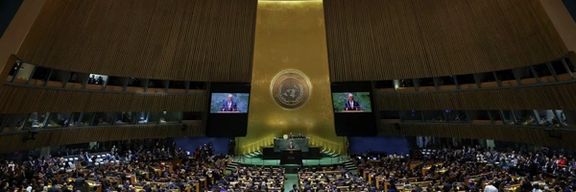
A UN General Assembly committee has slammed Iran for discriminating against and harassing women and girls, in addition to a host of other human rights violations.
The Third Committee of the 78th General Assembly approved a resolution entitled “Situation of human rights in the Islamic Republic of Iran” by a vote of 80 in favor to 29 against.
Another 65 countries, including many with a track record of human rights abuses such as Saudi Arabia, Egypt, and South Africa, abstained. A bevy of dictatorships voted against, including Iranian ally Russia, Belarus, Syria and North Korea.
The resolution, whose draft was introduced by Canada, condemned the misogynistic policies and practices of the Iranian regime, calling on Tehran to put an end to its discrimination against women.
The regime continues to introduce yet stricter legislation to crack down on hijab and ‘chastity’ laws as more women across Iran reject the mandatory headscarf and curbs on their behavior. Surveillance has been stepped up and like Mahsa Amini, the symbol of the Women, Life, Freedom uprising which began after her death in morality police custody last year, a 16-year-old girl, Armita Geravand, also died in their hands in recent weeks.
Citing “the Iranian authorities’ flagrant disregard for human rights, life and dignity”, the resolution condemned “the intensified, targeted repression of women and girls by Iran, both online and offline”. Women are arbitrarily arrested on the street for hijab refusal and refused entry to public spaces including universities, hospitals and public spaces.
Iran’s #MeToo movement has also chronicled systemic sexual abuse in the country’s legal system, women under constant threat of sexual violence on the streets and in prison.
The resolution cited “mass arrests and arbitrary detention, disproportionate use of force, including force leading to the death of peaceful protesters, and imposition and carrying out of the death penalty against those connected to the protests.”.
More than 500 demonstrators were killed by security forces in the protests following Mahsa's death, after they were given free rein by the regime’s top officials in an attempt to quell the uprising.
The resolution also called on Iran to end its harassment and persecution of political opponents and human rights defenders, especially those belonging to minority groups, a phenomenon which has worsened since the uprising.
In October, rights group Amnesty International reported a new wave of crackdowns on Baluchi protesters in Iran.
The people of Sistan-Baluchestan have been holding weekly protests after security forces opened fire at peaceful protesters, killing nearly 100 on September 30, 2022, a day known as the Bloody Friday of Zahedan. Zahedan is one of the few Sunni-majority cities in predominantly Shiite Iran.
“The authorities are ramping up their brutality to stop Baluchi protesters from gathering each week in Zahedan,” warned Diana Eltahawy, Amnesty International’s Deputy Regional Director for the Middle East and North Africa.
The resolution of the General Assembly’s Third Committee, which addresses social, humanitarian and cultural issues, also urged Tehran to cooperate with international human rights mechanisms, especially with the UN special rapporteur on human rights in Iran, Javaid Rehman.
Earlier this month, Rehman warned that the Israel-Hamas war bolsters repression inside Iran by deflecting attention from internal criticism of the regime to regional issues as the conflict instigated by Iran’s biggest Palestinian proxy against Israel, rages on.
In a post on X, Abram Paley, the US State Department's deputy special envoy for Iran, hailed the passing of the resolution. “We stand with the people of Iran as they continue their fight against oppression and violence and for a free and democratic future,” he said.
The resolution comes a week after United Nations reiterated concerns regarding the human rights situation in Iran, urging the release of detained protestors and an immediate end to executions which have also escalated since the uprising began in September last year.
The committee noted “the alarming increase of the use of the death penalty”. According to a UN report, at least 419 people were reportedly executed, including 409 men and 10 women, between January 1, 2023, and July 31, 2023, marking a 30 percent increase compared to the same period last year.
The committee also approved six resolutions including on the human rights situations in Ukraine, Syria, Iran, Myanmar and the Democratic People’s Republic of Korea.
Iran’s representative at the session, Zahra Ershadi, rejected the resolution branding it “biased and politically motivated”. Falling back on regime rhetoric to attack the West, she blamed it on “Canada, the United Kingdom, France, Germany, the United States, and the occupying and apartheid Israeli regime — the classic cast of characters and the usual suspects.”

In the aftermath of the government-related killing of Armita Gervanad, more than 20 women activists and journalists have reportedly been arrested in Gilan, north of Iran.
Armita Geravand,16, died after an altercation with hijab police led to her falling into a coma. She later died in hospital in echoes of the death of Mahsa Amini last year, whose death triggered a nationwide uprising.
The detainees include notable figures such as animal rights activists Rozita Rajaei and writer, and civil activist Nina Golestani. Additionally, environmental journalists and activists Haleh Nateghi and Nasim Tavaf are among those detained.
Informed sources indicate that the women are being detained by the Islamic Revolutionary Guard Corps (IRGC) accused of "conspiracy against national security" and "propaganda against the system." Families, despite their presence in the public and revolutionary court of Rasht, remain uninformed about the case details.
As of now, none of the detainees have been able to appoint a lawyer, and they are currently held in Lakan Prison in Rasht. This marks the second "mass arrest" of female activists in Gilan, following the recent uprising against the Islamic Republic.
Beyond Gilan, women activists in Tehran, Isfahan, and Tabriz have received summonses or been detained by the IRGC. The current situation of the detainees remains unknown.
Journalist and women's rights activist Manijeh Moazzen in Tehran was also arrested on November 8. Additionally, there are reports of the recent arrests of activists Mahnaz Tarah and Shaghayegh Moradi, with no information available about their whereabouts and conditions.
During the recent funeral of Armita, 62 women were reportedly detained and transferred to Evin and Gharchak prisons in Tehran.
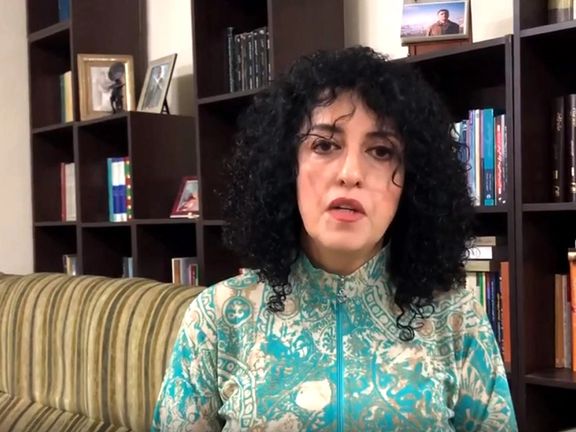
Narges Mohammadi, the imprisoned Nobel Peace Prize laureate, was once again denied medical care for refusing to wear the mandatory hijab.
In a post on her Instagram, an audio file was shared in which female prisoners chant, "Prisoners, Support, Support!"
Originally scheduled for a cardiac angioplasty on Wednesday, Narges Mohammadi's transfer from Evin Prison to the hospital was thwarted, citing her refusal to comply with mandatory hijab, a position she has stood firm on during her years in and out of detention.
Medical tests conducted last week revealed Mohammadi's critical health condition, including "blockage in two heart arteries, fluid accumulation around the heart, and severe inflammation of the gallbladder."
Mohammadi had previously reported her transfer to the hospital on November 8, without a headscarf and wearing a business suit. However, she returned to prison shortly afterward.
Since November 6, Mohammadi had been on a hunger strike in protest against the "Islamic Republic's policy of delaying medical attention for sick prisoners, risking the health and lives of human beings" and "the policy of death or compulsory hijab for Iranian women." She was refusing to comply with hijab laws in exchange for treatment.
Following her civil rights activism, Mohammadi was awarded the Nobel Peace Prize in 2023. International human rights organizations, including Reporters Without Borders, strongly condemned denying Mohammadi access to medical care, and the Nobel Committee expressed severe concern about her health.
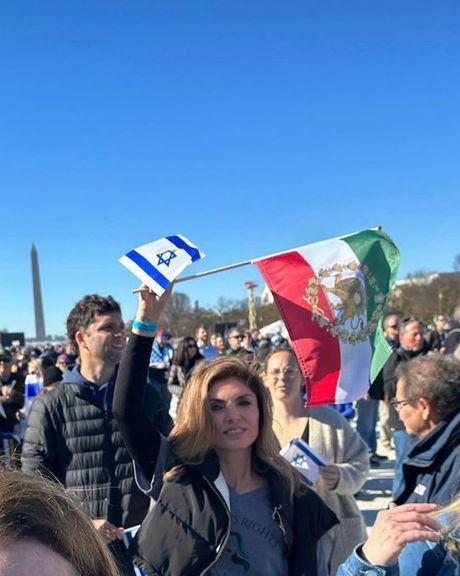
Iranian dissidents, including the exiled Crown Princess, were among demonstrators at a pro-Israel rally in Washington Tuesday to denounce anti-Semitism.
Protests and street demonstrations have erupted around the world on both sides since the Palestinian militant group Hamas mounted a surprise attack on Israel on October 7, killing at least 1,200 mostly civilians and taking at least 240 more hostage. It has since resulted in the most deadly war between the two sides since Hamas took power in 2007.
Iranians have shared their images on social media to demonstrate their presence at the Washington gathering. Among the protesters was the wife of the exiled prince of Iran, Yasmine Pahlavi.
At a recent football match in Tehran, hundreds of Iranian fans chanted for the removal of Palestinian flags displayed at the stadium.
While rampaging and burning American and Israeli flags in Iran is a part of state-sponsored activities, it has been captured on video that university students move to avoid stepping on painted American and Israeli flags placed on the ground by officials.
During protests, "Neither Gaza nor Lebanon, My Life for Iran" has been a common slogan as people voice their concern that while Iran's economic situation is deteriorating, the regime continues to financially sponsor terrorist groups in the region.